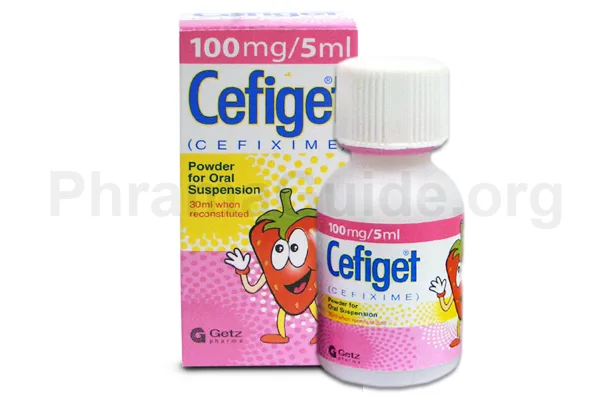Cefiget syrup is an antibiotic medication used to treat various bacterial infections. It belongs to the class of drugs known as cephalosporins. Cefiget syrup formulation is mostly recommended for children and adults where a low dose of medicine is needed. The following are common uses and indications of Cefiget Syrup:
- Respiratory Tract Infections: Cefiget syrup is often used for children with respiratory tract infections, including pneumonia, bronchitis, and otitis media (middle ear infection).
- Urinary Tract Infections: Cefiget syrup can be used to treat urinary tract infections (UTIs) in children. UTIs can occur in the bladder or kidneys and are caused by bacterial growth.
- Strep Throat: Cefiget syrup may be prescribed for children with strep throat, a bacterial infection caused by group A Streptococcus bacteria. It helps to relieve symptoms and eradicate the infection.
- Skin and Soft Tissue Infections: Cefiget syrup can be used to treat certain skin and soft tissue infections caused by susceptible bacteria, such as cellulitis or impetigo.
- Typhoid Fever: Cefiget syrup is sometimes used to treat typhoid fever, a bacterial infection caused by Salmonella typhi. However, the choice of antibiotics for typhoid fever may vary depending on the specific circumstances.
Off-label Uses of Cefiget Syrup
- Community-Acquired Pneumonia: Although Cefiget is not typically the first-line choice for pneumonia, it may be considered off-label for the treatment of mild to moderate cases caused by susceptible bacteria.
- Prophylaxis for Close Contacts with Meningitis Patients: In certain situations, Cefiget syrup might be used off-label to provide prophylactic treatment to close contacts of individuals with bacterial meningitis to reduce the risk of infection.
- Certain Gastrointestinal Infections: Cefiget syrup may be used off-label to treat certain gastrointestinal infections caused by susceptible bacteria, such as Salmonella or Shigella.

What is Cefiget?
Cefiget syrup is one of the leading brands of Cefixime in oral liquid form, manufactured and marketed by Getz Pharmaceuticals (Pvt) Ltd, Pakistan.
Cefiget Syrup’s Alternatives : Other Cefixime Brands
The following are some alternative brands of Cefiget Syrup and their manufacturer.
- Cebosh : Bosch Pharmaceuticals (Pvt) Ltd, Pakistan.
- Caricef : Sami Pharmaceuticals (Pvt) Ltd, Pakistan.
- Cefim : Hilton Pharmaceuticals (Pvt) Ltd, Pakistan.
- Cefspan : Barrett Hodgson Pakistan (Pvt) Ltd.
- Fixitil : Tabros Pharma (Pvt) Ltd, Pakistan.
- Icef : ICI Pakistan Ltd.
- Linzim : Bosch Pharmaceuticals (Pvt) Ltd, Pakistan.
- Magnett : S.J. & G Fazul Ellahie (Pvt) Ltd, Pakistan.
- Maxima : Macter International (Pvt) Ltd.
- Maxpan : Indus Pharma (Pvt) Ltd, Pakistan.
- Omixim : Searle Pakistan (Pvt) Ltd.
Cefiget : Available Formulations and Strengths
Presently, Cefiget is available in Syrup, Tables, and Capsule forms.
Cefiget Syrup : 100mg/5ml and 200mg/5ml strengths.
Cefiget Tablet : 200mg strength.
Cefiget Capsule : 400mg strength.
Who Should Not Use Cefiget?
Cefiget syrup has certain contraindications, which means there are circumstances in which its use is not recommended or should be avoided.
Hypersensitivity to cephalosporins: If a person has a known allergy or hypersensitivity to cephalosporin antibiotics or any component of Cefiget syrup, its use should be avoided. Allergic reactions to cephalosporins can range from mild skin rashes to severe, life-threatening reactions.
Severe renal impairment: Cefiget is primarily eliminated from the body through the kidneys. In individuals with severe renal impairment or end-stage renal disease, the clearance of Cefiget may be significantly reduced. Therefore, Cefiget syrup is generally not recommended in such cases.
History of severe gastrointestinal disease: Cefiget syrup should be used with caution in individuals with a history of severe gastrointestinal diseases, particularly colitis. It can potentially worsen the condition or lead to the overgrowth of resistant bacteria.
Certain medical conditions: Cefiget syrup should be used with caution or avoided in individuals with conditions such as liver disease, bleeding disorders, or a history of seizures. The dosage and frequency of administration may need to be adjusted in such cases.
Pregnancy and breast-feeding: The safety of Cefiget syrup during pregnancy and breastfeeding has not been well established. It is recommended to consult a healthcare professional before using Cefiget syrup in these situations to weigh the potential benefits and risks.
Recommended Daily Dosage of Cefiget Syrup
Cefiget Syrup Dose for Respiratory Tract Infections, such as Otitis Media or Bronchitis:
Children (6 months to 12 years):
- 8 mg/kg once daily or divided into two equal doses every 12 hours.
- The maximum daily dose should not exceed 400 mg.
Cefiget Syrup Dose for Urinary Tract Infections:
Children (6 months to 12 years):
- 8 mg/kg once daily or divided into two equal doses every 12 hours.
- The maximum daily dose should not exceed 400 mg.
Cefiget Syrup Dose for other Infections:
- The recommended doses may vary depending on the severity and type of infection. It’s important to follow the specific instructions provided by the prescribing healthcare professional.
How Cefiget Works?
Cefiget works by binding to and inhibiting an enzyme called penicillin-binding protein (PBP). PBPs are essential for the final stages of bacterial cell wall synthesis. By inhibiting PBPs, Cefiget interferes with the formation of peptidoglycan, a major component of the bacterial cell wall.

Leave A Comment